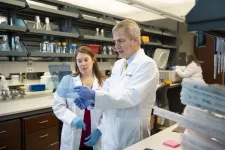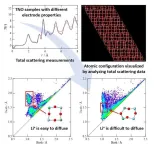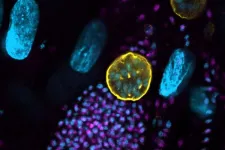(Press-News.org) Despite a modest 5% improvement since 2023, food insecurity in L.A. County remains alarmingly high — well above the national average and L.A.’s pre-pandemic level. A USC Dornsife College of Letters, Arts and Sciences study found that as of October 2024, 25% of L.A. County households — about 832,000 — struggle with food insecurity. By comparison, the national average is just 14%. Among low-income households in L.A. County, 41% experienced food insecurity in 2024, compared to 27% pre-pandemic.
“The high cost of living and food, coupled with cuts to assistance programs – persistent challenges for Angelenos – continue to fuel the crisis,” said Kayla de la Haye, lead author of the study and director of the Institute for Food System Equity at USC Dornsife’s Center for Economic and Social Research.
The study, spearheaded by USC Dornsife’s Public Exchange, also highlights relentlessly high rates of nutrition insecurity — characterized by limited access to healthy foods — which affects 29% of residents. Asian communities were disproportionately impacted, experiencing higher rates than other racial and ethnic groups.
Pandemic programs provided relief
During the COVID-19 pandemic, enhanced federal food assistance programs — known as CalFresh in California and SNAP nationwide — and expanded L.A. County food initiatives, helped reduce food insecurity among low-income households to pre-pandemic levels of 28% in 2021. However, the rollback of emergency boosts to these programs in 2022 and 2023, coupled with surging inflation, eroded those gains. By July 2023, food insecurity among low-income households surged to 44% — surpassing the pandemic peak of 42%.
The study also outlined fluctuations in food insecurity among all L.A. County households from 2021 to 2024, underscoring the precarious nature of access to food in the region. These trends are reflected in key data points that illustrate these changing rates and the scope of the crisis over time:
17% in December 2021 (553,000 households)
24% in July 2022 and December 2022 (802,000 households)
30% in July 2023 (1,002,000 households)
25% in October 2024 (832,000 households)
“We know that when programs lose funding or are terminated, food insecurity rates rise,” said de la Haye. “The correlation couldn’t be clearer.”
Low-income households hit hardest
This study’s findings align with data from earlier USC Dornsife studies, showing that food insecurity continues to disproportionately affect low-income, Latino, Black and young adult populations. Among low-income households, food insecurity remains very similar to the rate in the first year of the pandemic (42%). Latinos account for 76% of those impacted, with 69% between ages 18 and 40 and 59% women. Just under half (47%) of households with food insecurity have children.
“We’re trending in the right direction, but rates of food insecurity remain unacceptably high, particularly for communities of color and low-income individuals,” said de la Haye. “The evidence is unequivocal: Expanded, fully funded assistance programs and investment in our local food initiatives reduce food insecurity. Now, it’s about translating that evidence into action.”
Stark disparities in nutrition and food insecurity
The study includes findings from the first-ever tracking of nutrition insecurity among adults in L.A. County, covering data collected between 2022 and 2024. The results reveal disparities that extend beyond simply getting enough food. Nutrition insecurity — marked by limited access to healthy, nutritious food — was found to be 4% higher than food insecurity, affecting 27%–29% of Angelenos. Among racial and ethnic groups, Asian residents experienced the highest rate, with 35% affected.
When the researchers compared nutrition insecurity to food insecurity, they discovered significant racial disparities. Food insecurity rates among Black (31%) and Hispanic (32%) individuals are now three times higher than those among white residents (11%). In contrast, only 14% of Asians reported experiencing food insecurity.
“Tackling food insecurity isn’t enough without addressing the disparities in nutrition across racial and ethnic groups,” de la Haye added.
Food assistance programs fall short
Even though high food insecurity rates persist, many of the neediest Angelenos are not participating in food assistance programs. Only 29% of food insecure households in L.A. County are enrolled in CalFresh, and just 9% in WIC, the federal nutrition program for women, infants and children. Yet, among those receiving aid, many still struggle:
39% of CalFresh recipients are food insecure; 45% face nutrition insecurity.
24% of WIC recipients are food insecure; 47% are nutrition insecure.
Based on their findings, the researchers recommend renewed investments in evidence-based interventions, including:
Expanding financial support through CalFresh and WIC.
Making healthy, culturally relevant foods more affordable.
Increasing funding for food banks and pantries.
Sustaining local initiatives to strengthen the food system over the long term.
About the food and nutrition insecurity study
The study is based on data from the Understanding America Study (UAS), administered by the USC Dornsife Center for Economic and Social Research (CESR), using a representative sample ranging from 1,120 to 1,201 participants.
END
Food insecurity in LA County remains well above national average, despite slight decline
A new USC Dornsife study finds that while food insecurity in Los Angeles County fell 5% last year, 25% of households still struggle to put food on the table, amid cuts to food programs and lingering high costs.
2024-12-10
ELSE PRESS RELEASES FROM THIS DATE:
People with a positive attitude are built differently
2024-12-10
A positive attitude, what researchers call a "growth mindset" or belief in growth, is associated with both higher willpower and passion, according to a new large study.
People who believe they will succeed are far more passionate and have greater willpower than those who do not have the belief, says Hermundur Sigmundsson, a professor at the Department of Psychology at NTNU.
Sigmundsson has worked for many years to find out what makes people succeed in their goals. Now he and Professor Monika Haga at NTNU'S Department of Teacher ...
AML, sickle cell disease research among highlights of UC ASH abstracts
2024-12-10
University of Cincinnati Cancer Center experts will present abstracts at the 66th American Society of Hematology (ASH) Annual Meeting and Exposition Dec. 7-10 in San Diego.
Trial finds AML drug is safe in healthy volunteers
A randomized Phase 1 trial in healthy volunteers found a new drug targeting treatment-resistant acute myeloid leukemia (AML) is safe and attains drug levels that would predict response in this disease.
Up to 30% of patients with AML have a specific mutation called FLT-3, and a standard FLT-3 treatment called gilteritinib was approved by the Food and Drug Administration in 2018. But as the cancer has evolved, patients ...
Dozens of presentations advance multiple myeloma research at the 2024 American Society for Hematology (ASH) meeting
2024-12-10
MIAMI, FLORIDA (EMBARGOED UNTIL DEC. 9, 2024, AT 9 PM EST) – Patients with multiple myeloma are living longer, healthier lives thanks to a host of new immunotherapies and targeted drugs. But there is still no cure for the disease, the second most common blood cancer. Physician-scientists at Sylvester Comprehensive Cancer Center, part of the University of Miami Miller School of Medicine, are working to change that.
They will present research findings at the 2024 annual meeting of the American Society of Hematology (ASH), which will be held Dec. 7-10 in San Diego.
“We’d like to develop a curative ...
ASH 2024: Study shows that genetic mutations accumulate in smokers with myelodysplastic syndromes and worsen outcomes
2024-12-10
MIAMI, FLORIDA (STRICTLY EMBARGOED UNTIL DEC. 9, 2024, AT 9 PM EST) – Smokers with myelodysplastic syndromes (MDS) or a precursor condition had elevated levels of genetic mutations linked to the disease, a new study shows. The study also found that heavier smokers accumulated more mutations, and long-term smokers were more likely to show disease progression.
Led by Sangeetha Venugopal, M.D., M.S., a physician-scientist at Sylvester Comprehensive Cancer Center, part of the University of Miami Miller School of Medicine, the study further suggests that quitting smoking ...
Nature inspires self-assembling helical polymer
2024-12-10
Helical structures are ubiquitous across biology, from the double-stranded helix of DNA to how heart muscle cells spiral in a band. Inspired by this twisty ladder, researchers from Hiroshima University’s Graduate School of Advanced Science and Engineering have developed an artificial polymer that organizes itself into a controlled helix.
They published their results on Oct. 24 in Angewandte Chemie.
“Motivated by elegant biological helical structures, considerable effort has been devoted to developing artificial helical organizations with defined handedness ...
Could US-style summer holiday programs boost Aussie kids’ health?
2024-12-10
As the school year winds up, thousands of Aussie kids are looking forward to the summer holidays. But hand-in hand with this freedom comes an abundance of screentime, unhealthy snacks, and a lack of routine, and it has the potential to affect children’s physical and mental health.
In a new review of nearly 1500 participants University of South Australia researchers found that summer holiday programs, as offered through OHSC or sporting clubs, can help children stay engaged and active, helping offset the hours they spend in front of a screen.
UniSA PhD researcher and Fulbright Scholarship recipient Emily Eglitis says that summer programs ...
Towards safer, higher performance batteries through network topology optimization
2024-12-10
With rising greenhouse gas emissions, the urgency of addressing global warming and climate change has intensified, prompting a global shift towards renewable energy. The development of rechargeable batteries is essential for this effort. Lithium-ion batteries (LIBs) are one of the most widely used rechargeable batteries today, being used in cars, smartphones, and even for power storage. However, one major issue with LIBs is the risk of ignition. Commercial LIBs have a carbon-negative electrode with a low working potential. Since carbon operates near lithium metal deposition potential, there is a risk of internal short circuits, especially when the battery is quickly charged.
Alternative ...
ASH: Triplet combination regimens demonstrate high response rates in multiple leukemias
2024-12-10
ABSTRACTS: 216, 219, 1011
SAN DIEGO ― Three clinical trials led by researchers from The University of Texas MD Anderson Cancer Center demonstrated significant positive results from novel triplet therapies in the treatment of relapsed or refractory and newly diagnosed leukemias. The results were presented at the 66th American Society of Hematology (ASH) Annual Meeting and Exposition. More information on all ASH Annual Meeting content from MD Anderson can be found at MDAnderson.org/ASH.
Study demonstrates strong ...
Toxoplasma gondii parasite uses unconventional method to make proteins for evasion of drug treatment
2024-12-10
INDIANAPOLIS — A study by Indiana University School of Medicine researchers sheds new light on how Toxoplasma gondii parasites make the proteins they need to enter a dormant stage that allows them to escape drug treatment. It was recently published with special distinction in the Journal of Biological Chemistry.
Toxoplasma gondii is a single-celled parasite that people catch from cat feces, unwashed produce or undercooked meat. The parasite has infected up to one-third of the world's population, and after causing mild illness, it persists by entering a dormant ...
US e-scooter/e-bike injuries have tripled since 2019, fuelled by alcohol/substance use
2024-12-10
The numbers of e-scooter and e-bike injuries have tripled in the US since 2019, fuelled by alcohol and substance use, finds a nationwide analysis of emergency department visits, published online in the journal Injury Prevention.
And the odds of alcohol and substance use were much higher among 10-17 year old riders with these injuries than they were among older age groups, the findings show.
E-scooters and e-bikes, collectively known as micromobility devices, have become increasingly popular, thanks to their zero emissions, amid higher fuel prices and better biking infrastructure, note the researchers.
Emerging evidence points to increasing numbers of injuries associated ...
LAST 30 PRESS RELEASES:
Microalgae-derived biochar enables fast, low-cost detection of hydrogen peroxide
Researchers highlight promise of biochar composites for sustainable 3D printing
Machine learning helps design low-cost biochar to fight phosphorus pollution in lakes
Urine tests confirm alcohol consumption in wild African chimpanzees
Barshop Institute to receive up to $38 million from ARPA-H, anchoring UT San Antonio as a national leader in aging and healthy longevity science
Anion-cation synergistic additives solve the "performance triangle" problem in zinc-iodine batteries
Ancient diets reveal surprising survival strategies in prehistoric Poland
Pre-pregnancy parental overweight/obesity linked to next generation’s heightened fatty liver disease risk
Obstructive sleep apnoea may cost UK + US economies billions in lost productivity
Guidelines set new playbook for pediatric clinical trial reporting
Adolescent cannabis use may follow the same pattern as alcohol use
Lifespan-extending treatments increase variation in age at time of death
From ancient myths to ‘Indo-manga’: Artists in the Global South are reframing the comic
Putting some ‘muscle’ into material design
House fires release harmful compounds into the air
Novel structural insights into Phytophthora effectors challenge long-held assumptions in plant pathology
Q&A: Researchers discuss potential solutions for the feedback loop affecting scientific publishing
A new ecological model highlights how fluctuating environments push microbes to work together
Chapman University researcher warns of structural risks at Grand Renaissance Dam putting property and lives in danger
Courtship is complicated, even in fruit flies
Columbia announces ARPA-H contract to advance science of healthy aging
New NYUAD study reveals hidden stress facing coral reef fish in the Arabian Gulf
36 months later: Distance learning in the wake of COVID-19
Blaming beavers for flood damage is bad policy and bad science, Concordia research shows
The new ‘forever’ contaminant? SFU study raises alarm on marine fiberglass pollution
Shorter early-life telomere length as a predictor of survival
Why do female caribou have antlers?
How studying yeast in the gut could lead to new, better drugs
Chemists thought phosphorus had shown all its cards. It surprised them with a new move
A feedback loop of rising submissions and overburdened peer reviewers threatens the peer review system of the scientific literature
[Press-News.org] Food insecurity in LA County remains well above national average, despite slight declineA new USC Dornsife study finds that while food insecurity in Los Angeles County fell 5% last year, 25% of households still struggle to put food on the table, amid cuts to food programs and lingering high costs.





